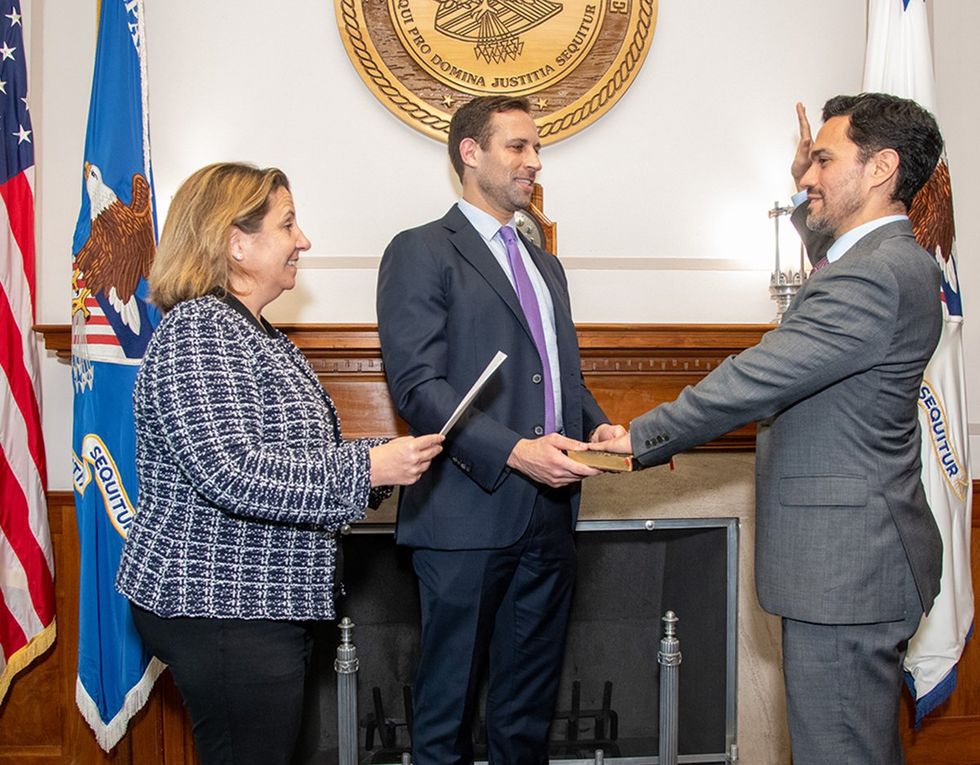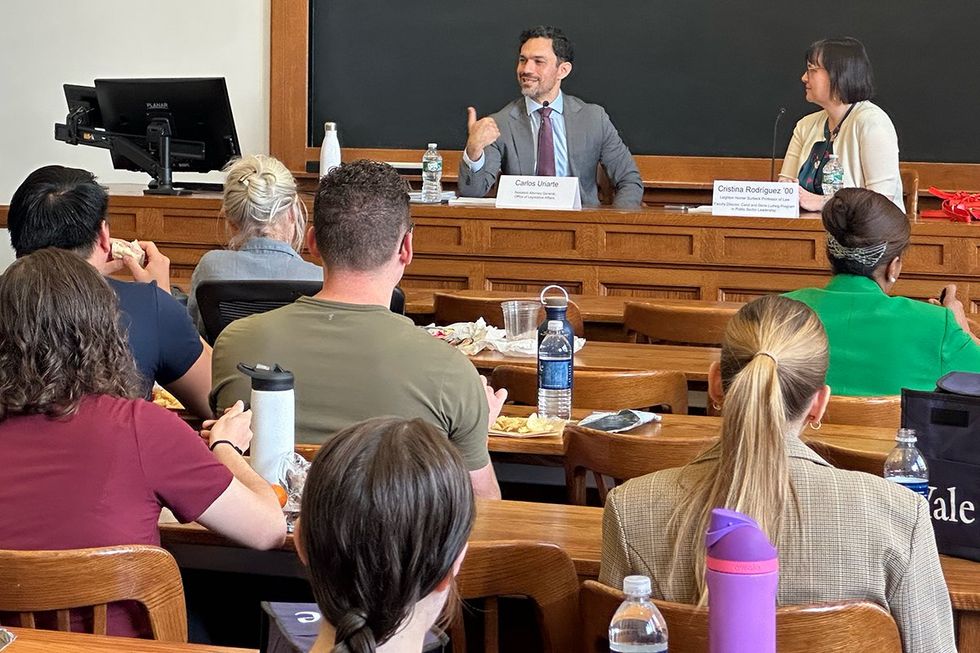The assistant attorney general for the Office of Legislative Affairs Carlos Uriarte is proof positive of what happens when personal passion and identity intersect with public service. However, it’s not just his credentials that make him stand out in the Biden-Harris administration. As a gay Latine, Uriarte’s journey to the Department of Justice reflects a more inclusive U.S.
Keep up with the latest in LGBTQ+ news and politics. Sign up for The Advocate's email newsletter.
Uriarte, 44, sat down with The Advocate in his spacious office, flanked by two aides, in the high-security Robert F. Kennedy Department of Justice Headquarters Building in Washington, D.C., for a wide-ranging interview.
Uriarte rose from his family’s humble roots to being a U.S. Senate-confirmed leader inside one of the most powerful institutions in the country. His grandparents, immigrants from El Salvador and Ecuador, found their version of the American dream through hard work — his grandfather, Uriarte says, started on the railroads before settling in San Francisco, later benefiting from the GI Bill to purchase the grocery store where he had once worked as a clerk. These family stories formed the foundation of Uriarte’s commitment to public service. “I grew up very much with a sense of obligation to give back,” he says.
But even with this foundation, Uriarte’s early years were marked by the kind of personal struggles that few in the nation’s capital used to discuss. Uriarte recalls his isolation while growing up in a small, predominantly white town in eastern Washington State,. He was a closeted gay Latine teenager — a combination that, at the time, felt like it could limit his future. “I grew up with a lot of shame around my identity and who I was,” he admits. It wasn’t just the slights he encountered from others — it was the fear that he wasn’t the type of person who could ever rise to a position of prominence in public service.
 Courtesy Department of Justice
Courtesy Department of Justice
Fortunately, Uriarte says, education and career offered him a change of scenery and perspective. College and law school introduced him to mentors and members of theLGBTQ+ community who helped him embrace his identity. After earning his law degree from the University of Pennsylvania Law School, Uriarte began his legal career with a prestigious clerkship for Judge Juan R. Sánchez of the U.S. District Court for the Eastern District of Pennsylvania. His passion for public service soon led him to Capitol Hill, where he served as legislative counsel to CaliforniaDemocratic Rep. Judy Chu and later as chief counsel for Investigations for the House Oversight Committee under South Carolina U.S. Rep. James Clyburn.
“I finally felt comfortable putting myself in a situation where I could be nominated and confirmed,” he says of his eventual appointment to his current position. When his Senate confirmation hearings rolled around in 2022, Uriarte’s partner, Nate, sat beside him. Uriarte says the committee chair recognized his partner and family — a powerful moment for a man who once feared that his identity might hold him back.
But what happens after such a personal triumph? For Uriarte, the answer is clear: you give back. As head of the DOJ’s Office of Legislative Affairs, Uriarte is tasked with maintaining the department’s often fraught relationship with Congress. It’s a role that requires finesse and a deep understanding of what oversight means for the justice system. “Congressional oversight, transparency, accountability — these things make the Department of Justice better,” Uriarte explains, noting his experience as a congressional staffer tasked with supporting Congress’s oversight role. He has testified on Capitol Hill before congressional committees on several occasions.
It’s that understanding that Uriarte leans on heavily in his day-to-day work. His journey allows him to view the law through a more human lens. “I’ve been someone who was teased growing up,” he reflects, “but everyone has those experiences in some way or another, even if you’re not Latino or a member of the LGBT community,” he says, adding, “and being able to identify with other people’s experiences, I think, has made me more effective.”
Uriarte’s biggest challenge may lie in protecting the rights of the LGBTQ+ community, particularly in a political environment increasingly hostile to transgender Americans. The DOJ has prioritized protecting civil rights under Attorney General Merrick Garland, Uriarte says . He notes that the department’s work has been vital in challenging discriminatory state laws, especially those targeting transgender youth and their access to gender-affirming care.
For instance, the DOJ has filed a complaint challenging Tennessee’s Senate Bill 1, a law banning medically necessary care for transgender youth. The case, now before the U.S. Supreme Court as U.S. v. Skrmetti, will be heard during the court’s new term beginning in October. SB 1, signed by Republican Gov. Bill Lee, bans surgeries, puberty blockers, and hormone treatments for transgender minors — a law the DOJ argues violates the Equal Protection Clause of the Fourteenth Amendment. The stakes are high, as this case will shape the future of access to gender-affirming care across the country.
According to the American Civil Liberties Union, more than 500 anti-LGBTQ+ bills were introduced in 2024 alone, many of them directly targeting transgender people’s access to health care. Uriarte says that the DOJ is committed to pushing back against these laws, advocating for the rights of vulnerable youth in a climate that increasingly seeks to restrict their access to essential medical care.
“It’s important that the community understands the DOJ sees them,” Uriarte says.
 Courtesy Washington University, St. Louis
Courtesy Washington University, St. Louis
Uriarte’s role isn’t limited to just pushing back on harmful laws in his communications with Congress. He also helps lead efforts to combat hate crimes and strengthen relationships between law enforcement and the LGBTQ+ community. It’s a delicate balance, he says — one that requires both policy know-how and a deep understanding of the cultural chasm that has long existed between the police and queer Americans.
According to the Federal Bureau of Investigation, hate crimes against LGBTQ+ people have surged, even as overall crime has declined. In its 2023 Crime in the Nation Statistics report, the FBI documented a 23 percent increase in hate crimes based on sexual orientation and a 16 percent rise in those targeting gender identity. With more than one in five hate crimes motivated by anti-LGBTQ+ bias, these numbers paint a grim picture of rising intolerance in the U.S.
In a political landscape where misinformation and disinformation are rampant, particularly around transgender rights, Uriarte says that he is part of the DOJ’s fight to set the record straight. In cases where state laws restricting gender-affirming care have been challenged, the DOJ’s filings have made clear the real harm these laws inflict on gender-nonconforming individuals, he says. And Uriarte ensures that senior officials, from the Bureau of Prisons director to other DOJ leaders, are equipped to tackle these thorny issues when they face Congress.
“Whenever [Bureau of Prisons director Colette S. Peters] is on the Hill, [she] will get questions about the treatment of transgender inmates, and the thing that she has prioritized there is that she has policies that ensure that she and her team can make determinations that are in the best interest of the safety of all adults in custody,” Uriarte says. “So making sure that our leaders who are talking to Congress and the public about these issues are well-equipped to accurately reflect the issues [is] a really important part of hopefully improving the dialogue.”
Uriarte says he can thrive in an administration that champions diversity while never losing sight of his roots. Though he’s acutely aware that there are still relatively few Latine or LGBTQ+ people in senior government positions, Uriarte is using his influence to inspire others. “I hope my story can help people feel more comfortable regardless of where they come from or their background of pursuing public service and these types of leadership roles in public service,” he says.
But Uriarte isn’t just about symbolism. Uriarte’s authenticity might be his most potent tool in a city that often values conformity over character. He’s hands-on in mentoring the next generation of public servants. Uriarte frequently tells law students to “find strength in the things that make you different.” It’s the advice he says he received from the late Maryland Congressman Elijah Cummings, a Democrat who once told him to “find what feeds your soul” — words that still resonate with him today.
Those are opportunities “for me to talk a little bit about my personal story and how I got here and to make sure that they can hear about some of the challenges and maybe trepidations I had about this career path earlier my life,” he says. “And hopefully, that can also give them confidence to pursue these types of roles.”


 Courtesy Department of Justice
Courtesy Department of Justice Courtesy Washington University, St. Louis
Courtesy Washington University, St. Louis
















































































